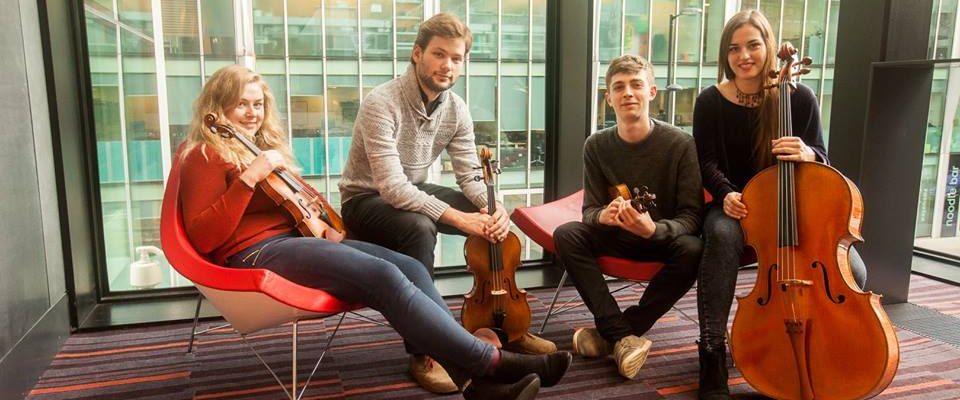Young Artist Interview: Five Minutes with the Marmen Quartet
Multi-award winning Marmen Quartet are gaining global recognition for their unique, exciting performances and incredibly distinctive sound. Here violinist Johannes Marmen (JM) and violist Bryony Gibson-Cornish (BGC) tell the Musicians’ Company (MC) about their award-winning year, what they’re up and how they bring their love for chamber music to schools.
MC: It’s been a year of competition wins – ROSL AMC Ensembles winner, Musicians’ Company Concordia Award, the list goes on. How important is competition success to the Marmen Quartet?
BGC: Competition success is of course a critical part of becoming established as a quartet, as many of the connections that we make through competitions lead to further concert opportunities. Many competitions are also linked to generous bursaries which we have been extremely helpful in assisting our development as a quartet. Sometimes, we find that the process of preparing for a competition can be more important than the outcome of the competition itself, as we demand the very best from ourselves and each other. Our strategy is to enter as many competitions as we can so that we keep on making new connections, challenging ourselves and performing to the very highest level.
MC: You’ve been playing and performing together for five years. How have you grown and changed, and where do you hope to see the Marmen Quartet five years from now?
JM: The support of our mentors and teachers has been what has shaped us the most, both by teaching us so many things, but also by encouraging us to trust our own instincts. For us, there has always been this symbiosis present, of attempting to absorb all the knowledge and experience that’s being given to us, yet at the same time always reaching deeper within ourselves. I think that’s the basic continuing challenge that makes us grow as musicians; continue to be inspired, yet always be true to yourself.
Other than that, we have had a couple of member changes along the way, which has proven that a common long term commitment is essential for a good and productive working environment, as the whole quartet ecosystem is so much built around trust. Since we started out, we have also developed a much more structured way of approaching our interpretational and technical work, which has improved our efficiency a lot, thus giving us more time to explore interesting new directions and ideas.
So overall you could say that we have matured a lot in five years, and the only thing we can wish for the future is that we continue to do so. In five years time we hope to have a very busy concert schedule around continental Europe and America as well as the UK.
MC: You enjoy playing a wide range of repertoire, but which pieces best represent you as a group? Which have brought you the most success?
JM: We only choose pieces that we are all very excited and passionate about, so we’re probably best represented by the full recital programmes that we create. At the moment, we’re really looking forward to upcoming recitals of Haydn’s op. 74 no. 1 in C major, Ligeti’s 1st quartet and Beethoven’s op. 131 in C sharp minor. Having said that, there are definitely a few pieces that have sort of been there along the way for several years now, with which we have formed very strong relationships. Beethoven’s op. 132 in A minor and Mozart’s K. 387 in G major are two such pieces, as well as Janacek’s 1st quartet, the “Kreutzer sonata”, which we love performing. Lastly, I think we all have very strong memories of late night rehearsals of the slow movement from Mendelssohn’s op. 80 in F minor, which must be one of the most touching and honest pieces there is.
MC: “Performing is all about communication. It’s telling a story and I feel the Marmen are dedicated to this ideal” Peter Cropper. How do you go about telling a story without words?
JM: Humans have always told stories, we want to share our human experience with each other and feel emotions together. The memories and experiences that we want to share the most are the ones that made us feel strongly. Music is stories without the explicitness of words, stripped down to their bare emotions, which is why it speaks so directly between us, and why it can move us so deeply.
We as performers are the medium between the composer and the audience, and it’s our duty to tell the composer’s story with clarity, whilst infusing every single note with our own personal feelings. This is when both the storyline and the emotion of the music can be fully experienced by the audience, and it takes a lot of hard work to get to that point. When rehearsing, we must always seek a greater intellectual understanding of the pieces we play, because the more comprehensive our own vision of the musical structure is, the more free we can be when performing. The most utopian state of performance is when you feel so close to the music and the composer in your understanding that you’re completely free and daring to do exactly what your heart tells you in any moment. The story written by the composer will flow through you like light flows through stained glass; when it reaches the audience it will be completely true to its own nature and filled to the brim with bare emotions. That’s when a story without words can transcend a story with words.
MC: It’s great you’re working hard to promote music through outreach and education. How do you appeal to a young audience perhaps more interested in technology than Beethoven?
We find that the best way to approach this is through workshops with young audiences which involve us breaking down mammoth works like Beethoven into more digestible pieces. Generally, if we find a way of linking classical music to popular music, then we can show young audiences that they are not so far away from each other. For example, a pop song with a recurring chorus is much like a rondo movement of a classical quartet. We also find that talking to the audience at the beginning of the concert can also set up a listener of any age for an engaging musical experience, as we can provide them with aspects of the works to listen out for and some historical or emotional background on the composer.
On a different educational note, we are fortunate to be starting a Fellowship in Chamber Music at the Guildhall School of Music and Drama in September. This will involve a number of initiatives and collaborations with the faculty and student body and we hope to show aspiring groups that it is possible to pursue a career in chamber music.
MC: You’re back in Buenos Aires next year, after taking part in last year’s Foco Boulez festival at the Teatro Colon. What will you be doing in Argentina this time? What other gigs are you looking forward to this year?
We are thrilled to be doing our very first Beethoven Cycle next year in Buenos Aires and other places yet to be announced. Performing all sixteen of his quartets at this stage in our career poses an incredible opportunity and will help us develop as a quartet hugely. We are also looking forward to performing at summer festivals in Larzac, France; Hitzacker, Germany; and throughout the UK in Edinburgh, Machynlleth, Swansea, North York, North Norfolk and Oxford. Our next London performance is a lunchtime concert at St. James’s Piccadilly on September 5.
MC: Lastly, you’re a culturally diverse group. But what type of restaurant are you most likely to agree to go to on a night out together – British, Swedish or Japanese? Or something completely different?
BGC: As a kiwi, my primary concern is working out where to find a decent coffee! Johannes also likes to discuss this at great lengths, much to the disdain of Ricky and Steffan. But when it comes to going out, we generally choose wherever is closest to rehearsal. Generally we have been known to favour burger joints and Italian restaurants.
The Marmen Quartet would like to acknowledge the generous support they have received from Music in the Round, Royal Overseas League, Hattori Foundation, the Musicians’ Company, Concordia Foundation, Royal Philharmonic Society (Albert & Eugenie Frost), the Carne Trust, Royal College of Music and Guildhall School of Music and Drama.
You can find out more about the Marmen Quartet at their yeomen page, or their website www.marmenquartet.com/welcome
Interview by Suzy Willmott @suzywillmott





